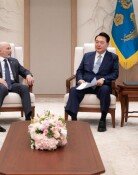Presidential runners put security pledges on back burner
Presidential runners put security pledges on back burner
Posted April. 06, 2017 07:21,
Updated April. 06, 2017 07:30
North Korea launched a ballistic missile on Wednesday over the East Sea from Sinpo, South Hamgyong Province. The South Korean and the U.S. military authorities said the missile was estimated to be “a type of KN-15 medium-range ballistic missile,” also known as Pukguksong-2. The type of missile has a short launch preparation time because it uses solid fuel and is hard to detect as it is mounted on a mobile launch vehicle. As it has U.S. military bases in Japan and Guam within its range, it is obviously targeting the United States.
It flew just 60 kilometers this time but soared to up to 189 kilometers in altitude, as it was launched at an high angle of 93 degrees. Although experts are divided over whether the launch was a failure or the flight distance was intentionally controlled, they agree that the North sent a message to the international community ahead of the U.S.-China summit that it had no intention of making a compromise in its nuclear and missile development. The international consensus has become bigger that the two great powers should treat the issue as a key agenda at the summit.
The Korean Peninsula is in an urgent situation where the possibility of a military clash cannot be ruled out. Moreover, major U.S. national television channel NBC sent one of its top anchor to South Korea to report on the frontline and broadcast live news reports on tensions on the peninsula, as it did in the 1994 crisis over the North Korean nuclear weapons development. There are even poll results showing that 58 percent of Americans think that the U.S. should use its military forces in the event of a military confrontation between South Korea and China.
However, we, South Koreans, are quiet, although we are living in a place that could be turned into a battlefield any time. Even though one of the greatest challenges for Seoul’s next leader is the security crisis, it is put on the back burner on the presidential candidates’ election pledges. There should be no partisan calculations before national security, the political parties have totally different views of the North Korean regime.
Moon Jae-in, the front-runner in the presidential race, argues that the issue of the planned development of the Terminal High Altitude Area Defense system be handed over to the next National Assembly session, calling for an effective halt to the deployment. He even advocates resuming the Kaesong Industrial Complex and Mount Kumgang tours that would neutralize the United Nations sanctions and international cooperation against North Korea. Ahn Chul-soo, who is trailing Moon, also reversed his position on the Kaesong Industrial Complex, shifting from the resumption of the Kaesong Industrial Complex to not resuming its operation. Conservative candidate Hong Joon-pyo consistently advocates strong punishment of North Korea, but he has yet to make a case of his call for nuclear armament or present detailed pledges on defense reform. Our fate depends on the perspective of national security and diplomatic capabilities of the next leader who will be elected in five weeks.







